| Article ID | Journal | Published Year | Pages | File Type |
|---|---|---|---|---|
| 8537669 | Progress in Neuro-Psychopharmacology and Biological Psychiatry | 2017 | 8 Pages |
Abstract
Brain oxidative status is a crucial factor in the development of sporadic Alzheimer's disease (AD). Klotho, an anti-aging protein, diminishes oxidative stress by the induction of manganese superoxide dismutase (MnSOD). Thus, the substances that increase klotho expression could be considered as a potential treatment for Alzheimer's disease when the oxidative imbalance is present. Statins are suggested to up-regulate klotho expression. We examined the effect of simvastatin (5Â mg/kg, daily for 3Â weeks) on hippocampal klotho and MnSOD expression in the cognitive declined animal model induced by intracerebroventricular (ICV)-streptozotocin (STZ) administration. Cognitive assessment was performed by the Morris Water Maze (MWM) test. The results indicated that mean escape latency and distance were prolonged in the ICV-STZ group compared with the control group. The expression of klotho and MnSOD were also down regulated in the hippocampus. Furthermore, improved spatial performance was observed in simvastatin-treated animals. This effect could be related to increase in oxidative stress tolerance as evidenced by klotho and MnSOD up-regulation. Our current study indicates that klotho upregulation may be a neuroprotective mechanism of simvastatin against cognitive decline in AD.
Keywords
Related Topics
Life Sciences
Neuroscience
Biological Psychiatry
Authors
Soheila Adeli, Maryam Zahmatkesh, Gholamreza Tavoosidana, Morteza Karimian, Gholamreza Hassanzadeh,
